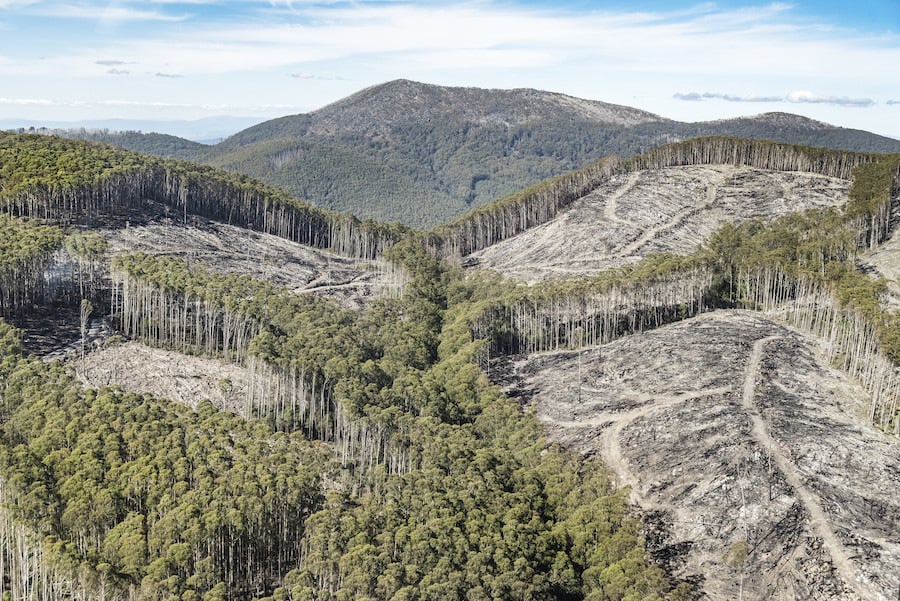News - 20 December 2023
Assessment of the Central Highlands paves the way for the Great Forest National Park

This week the Victorian Environment Assessment Council (VEAC) released their interim report, Assessment of the values of state forests in the Central Highlands.
VEAC was tasked with assessing these values within the context of the cessation of industrial logging in state forests on 1 January 2024 (now just days away).
The report found that "The tall wet ash forests of the Central Highlands have very high values for nature conservation, cultural heritage, water production, carbon storage, recreation and tourism, science, and many other uses."
Although the immediate threat of industrial logging has subsided for now, the report makes clear that these phenomenal values are still under existential threat, particularly from the impacts of climate change, with extreme weather events such as heatwaves, storms, floods and wildfires increasing in frequency and severity.
With the details outlined in this new report, the Victorian government has the perfect opportunity to deliver new, much loved national parks for the benefit of all Victorians, right on Melbourne's doorstep.
For decades, locals and visitors alike have campaigned for these places to be protected once and for all, including through the creation of the Great Forest National Park—a proposal supported by 76% of Victorians in the lead-up to the 2022 election.
It’s a sad reality that these forests have been over-logged and burnt for decades for timber products, and cheap office paper. Now there is an exciting opportunity for these forests to be better managed for the benefit of all Victorians and promoted so that the stunning natural and cultural values of these areas are appropriately respected, recognised and enjoyed.
It’s been known and documented for years that the mountain ash forest ecosystem in the central highlands is on the verge of collapse. This VEAC report further demonstrates the phenomenal natural values that the government has a responsibility to preserve.
With industrial logging in Victoria ending in a matter of days, and this report clearly outlining future options for these forests, the Allan Government has another vital pillar of important information to get on with delivering a fabulous outcome for nature and people.
There’s now a huge opportunity to get these protections in place, so Victoria can get on with creating hundreds of sustainable new jobs in the regions, led by First Peoples, returning health to Country through revegetation, pest control, wildfire mitigation and other active management.
It is disappointing to see that Cultural Heritage values have not been assessed in this part of VEAC’s report. Cultural heritage values are every bit as important as other social or economic values. The Wilderness Society very much hopes and expects that VEAC will properly include Wurundjeri, Taungurung, Bunurong and Gunaikurnai rights, values, interests and aspirations for Country in its final report.
The report deems some areas to be subject to moderate or high conflicting uses. These areas will be forwarded to the Eminent Panel for Community Engagement (EPCE) for consideration. The Wilderness Society looks forward to participating in EPCE processes which will make recommendations to the government on appropriate next steps.
However, given the report states that “VEAC has identified large areas of high natural values with relatively low conflicting uses that could be protected in a public land category such as national park, and that link the existing national parks in the region” there’s no reason why the Allan government can’t immediately get on with drafting legislation to finally protect these treasured landscapes once and for all.Matt Landolfo, Campaigns Manager for Wilderness Society Victoria, said, "This VEAC report confirms what has been known for decades–that the government has a responsibility to preserve the phenomenal natural, cultural, social and economic values of the Mountain Ash forests of the Central Highlands. Even with the threat of industrial logging coming to an end this year, climate change still looms as an existential threat, with extreme weather events such as wildfire, heatwaves and floods increasing in frequency and severity.
“For decades, locals and visitors alike have campaigned for these places to be protected, including through the creation of the Great Forest National Park. This is a prime opportunity to create hundreds of sustainable new jobs in the regions, led by Traditional Owners, in returning health to Country through revegetation, pest control, and wildfire mitigation."It’s disappointing to see that Cultural Heritage values have not been included in this part of VEAC’s report. Cultural heritage values are no less important than other social or economic values, we hope and expect this will be covered in the final report.”
This draft report will be provided to the Government’s Eminent Panel for Community Engagement (EPCE) who will provide recommendations to the government on the future use of the state forests.